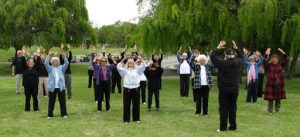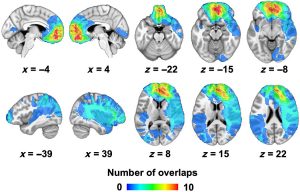Decrease Aging Cognitive Decline with Qigong Practice
By John M. de Castro, Ph.D.
“various activities such as Qi Gong, Tai Chi, Meditation, Yoga, Pranayama (breath work) and more can slow down the aging process and also reverse DNA damage.” – Beyond Spiritual Healing
The aging process involves a systematic progressive decline in every system in the body, the brain included. The elderly frequently have problems with attention, thinking, and memory abilities, known as mild cognitive impairment. An encouraging new development is that mindfulness practices such as meditation training and mindful movement practices can significantly reduce these declines in cognitive ability. In addition, it has been found that
mindfulness practices reduce the deterioration of the brain that occurs with aging restraining the loss of neural tissue. Indeed, the brains of practitioners of meditation, yoga, and Tai Chi have been found to degenerate less with aging than non-practitioners.
Qigong has been practiced for thousands of years with benefits for health and longevity. Qigong training is designed to enhance function and regulate the activities of the body through regulated breathing, mindful concentration, and gentle movements. Qigong practice has been found to be effective for an array of physical and psychological issues. Qigong has been shown to help the elderly improve attention, balance, reducing falls, arthritis, cognitive function, memory, and reduce age related deterioration of the brain. So, it makes sense to further study the ability of Qigong training to reduce cognitive decline in the elderly.
In today’s Research News article “Effect of 1 Year of Qigong Exercise on Cognitive Function Among Older Chinese Adults at Risk of Cognitive Decline: A Cluster Randomized Controlled Trial.” (See summary below or view the full text of the study at: https://www.frontiersin.org/articles/10.3389/fpsyg.2020.546834/full?utm_source=F-AAE&utm_medium=EMLF&utm_campaign=MRK_1473550_69_Psycho_20201103_arts_A ) Jin and colleagues recruited healthy elderly adults, over 60 years of age, who did not engage in any mind-body practices like Qigong and randomly assigned them to receive either Qigong practice or stretching practice. Each intervention had 3 weekly training sessions followed by 1-year of at least twice a week 60-minute practice guided with videos and included once a month refresher training. The participants were measured before and after training for cognitive performance and neuropsychological performance.
They found that compared to baseline and the stretching group the Qigong participants had significantly higher cognitive performance after the year’s practice including memory, visuospatial ability, and language ability. The number of Qigong participants who were classified as having a mild cognitive impairment declined over the year while the stretching group did not.
These results suggest that Qigong practice improves cognitive ability and reduces cognitive decline in the elderly. Age related cognitive is inevitable and greatly reduces the abilities and quality of life of the elderly. Reducing the decline should contribute to greater well-being in aging individuals.
These findings suggest that Tai Chi practice is a safe and effective method to reduce the decline in thinking ability with aging. But the story is even better. Qigong is not strenuous, involves slow gentle movements, and is safe, having no appreciable side effects, it is appropriate for all ages including the elderly and for individuals with illnesses that limit their activities or range of motion. It can also be practiced without professional supervision and in groups making it inexpensive to deliver and fun to engage in. This suggests that Qigong practice should be recommended for the elderly.
So, decrease aging cognitive decline with Qigong practice.
“Qigong can complement Western medicine in many ways to provide better healthcare. For example, qigong has special value for treating chronic conditions and as a preventive medicine, whereas Western medicine has special value for treating acute conditions.” – Qigong Institute
CMCS – Center for Mindfulness and Contemplative Studies
This and other Contemplative Studies posts are also available on Google+ https://plus.google.com/106784388191201299496/posts and on Twitter @MindfulResearch
Study Summary
Jin J, Wu Y, Li S, Jin S, Wang L, Zhang J, Zhou C, Gao Y and Wang Z (2020) Effect of 1 Year of Qigong Exercise on Cognitive Function Among Older Chinese Adults at Risk of Cognitive Decline: A Cluster Randomized Controlled Trial. Front. Psychol. 11:546834. doi: 10.3389/fpsyg.2020.546834
ABSTRACT
Background: The rapidly aging Chinese population is showing an increase in age-related illnesses, including mild cognitive impairment and Alzheimer disease. The best types of physical activity for the improvement of cognition remain unknown. This study aimed to compare the effectiveness of a tailored qigong exercise with that of stretching exercise in the maintenance of cognitive abilities in Chinese elders at risk of cognitive decline.
Methods: Seventy-four community-dwelling adults aged ≥60 years were screened for eligibility. Using a randomized control group design, participants with scores ≥19 on the Chinese version of the Montreal Cognitive Assessment-Basic (MoCA) were allocated to a 1-year qigong intervention (n = 33) and a stretching control exercise group (n = 33). The primary outcome was the MoCA score, as a measure of global cognitive function, and secondary outcomes were globe cognition and five domain scores on the Chinese version of the Repeatable Battery for the Assessment of Neuropsychological Status (RBANS). The MoCA and RBANS were administered at baseline and 1 year after intervention to assess the effect of the exercises on cognitive decline.
Results: Twenty-five of 33 (75.8%) participants in the qigong group and 26 of 33 (78.8%) participants in the control group completed the 1-year exercise programs. A bivariate test revealed strong correlation between MoCA and RBANS total scores after the intervention (r = 0.517, p < 0.01). Generalized estimating equations revealed a lower risk of progression of cognitive decline at 1 year in the qigong group than in the control group (odds ratio, 0.314; 95% confidence interval, 0.103–0.961; p = 0.04). Two-way repeated-measures ANOVA followed by post hoc t tests with Bonferroni corrections indicated that MoCA and RBANS scores were significantly higher in the qigong group than in the control group (MoCA and RBANS global cognition, memory, visuospatial/constructional ability, and language, all p < 0.01), with the exception of RBANS attention score (p > 0.05).
Conclusions: One year of qigong practice was significantly superior to stretching exercise not only for the prevention of cognitive decline progression, but also for the improvement of several cognitive functions, among older Chinese adults at risk of cognitive decline.



